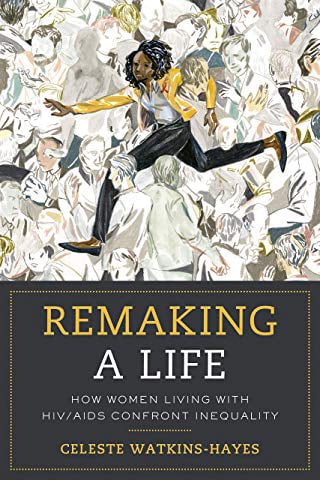Q&A: Prof. Celeste Watkins-Hayes talks about new book “Remaking a Life”

The cover of “Remaking a Life.” Celeste Watkins-Hayes’ book focuses on the inequality women face living with HIV/AIDS.
February 12, 2020
Since 2005, Weinberg Prof. Celeste Watkins-Hayes has interviewed more than 100 women in Chicago living with HIV and another 75 activists, service providers and policy officials. Her new book, “Remaking a Life: How Women Living with HIV/AIDS Confront Inequality,” examines an epidemic driven by inequality through stories of power and resilience. The Daily spoke to Watkins-Hayes about the process of writing the book and her advice to people living with HIV.
This conversation has been edited for length and clarity.
The Daily: What was your inspiration for interviewing these people and writing a book about women living with HIV?
Celeste Watkins-Hayes: So my interest in the topic goes back to my time as a graduate student. I was a research assistant on a project looking at low-income women and their economic survival strategies. One of my participants was a woman who was living with HIV. I was very intrigued by the fact that although she was grappling with this very serious illness, she had a network and a community that was quite unusual. It was economically and racially diverse, and I got interested in this support community that was produced by the HIV/AIDS epidemic and the activism that it sparked.
The Daily: HIV is a very sensitive topic. Did you expect people to be open to talking to you? Were the conversations more difficult or easier than you initially expected?
Watkins-Hayes: I recognized it as a sensitive topic and as a topic that was also tied to trauma in a lot of different ways, whether it’s the individual trauma that someone might have experienced or just thinking about the collective trauma of communities that are marginalized. I anticipated the interviews to be quite difficult and challenging, but I was really heartened by the number of women who are willing to come forward to share their stories and who did it out of a clear desire to help those going through a similar situation.
The Daily: A focus of the book and what you’ve talked about has been policymaking surrounding HIV. What advice would you give to politicians or policymakers to better support HIV positive people, especially women?
Watkins-Hayes: Support the HIV safety net. We are in a policy conversation around how we might end this epidemic and some are optimistic and believe that we can end the epidemic by the year 2030 in the United States. Particularly because we’ve got effective medications available. But what is really important for us to understand is that we can’t prescribe our way out of the epidemic because HIV is an epidemic driven by inequality. We know that taking those medications as prescribed, getting access to those medications, and getting access to the information that people need to be able to prevent HIV really only happens when people have access and have resources. We unfortunately know that because of all kinds of inequalities, not all groups have the same access to the same amount of information and resources to fight the epidemic. So the HIV safety net is designed to help fill that gap by providing access to medical and social services for people who couldn’t otherwise afford it.
The Daily: What do you hope readers take away from the research that you did? What do you wish that students better understood about the research process?
Watkins-Hayes: Being at a research-intensive university like Northwestern, you come to understand the importance of research to shape the public debate and to shape public policy. The research that I do is designed to not only inform other scholars but also to help the people who were featured in the book. It’s designed to inspire women living with HIV by showing them examples of people who have walked their path and have nevertheless found ways to resist and to confront the inequalities that threaten to hobble them and even end their lives. What I truly hope is that this book inspires women to really see how powerful they can be and how powerful they are when they tell their stories and speak truth to power.
Email: jordanmangi2023@u.northwestern.edu
Twitter: @jordanrose718


